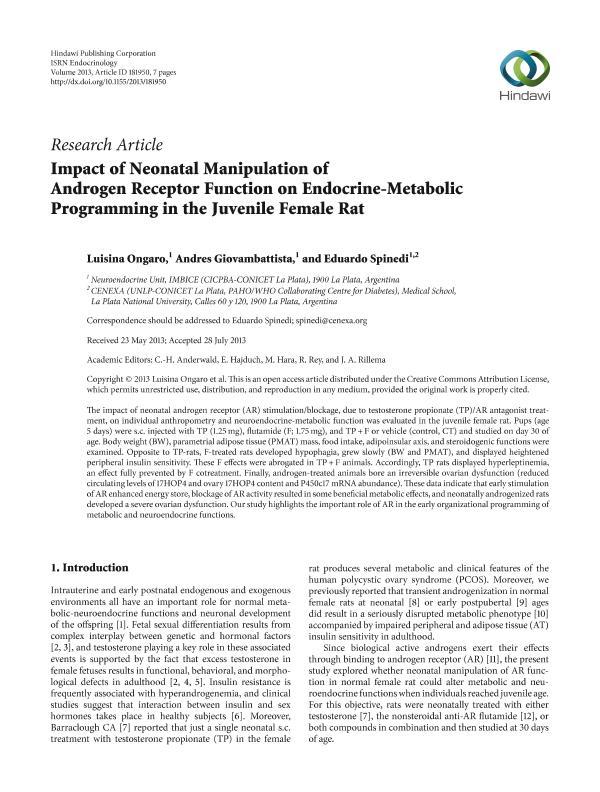Artículo
Impact of Neonatal Manipulation of Androgen Receptor Function on Endocrine-Metabolic Programming in the Juvenile Female Rat
Fecha de publicación:
08/2013
Editorial:
International Schorlaly Research Network
Revista:
ISRN Endocrinology
ISSN:
2090-4630
e-ISSN:
2090-4649
Idioma:
Inglés
Tipo de recurso:
Artículo publicado
Clasificación temática:
Resumen
The impact of neonatal androgen receptor (AR) stimulation/blockage, due to testosterone propionate (TP)/AR antagonist treatment, on individual anthropometry and neuroendocrine-metabolic function was evaluated in the juvenile female rat. Pups (age 5 days) were s.c. injected with TP (1.25 mg), flutamide (F; 1.75 mg), and TP + F or vehicle (control, CT) and studied on day 30 of age. Body weight (BW), parametrial adipose tissue (PMAT) mass, food intake, adipoinsular axis, and steroidogenic functions were examined. Opposite to TP-rats, F-treated rats developed hypophagia, grew slowly (BW and PMAT), and displayed heightened peripheral insulin sensitivity. These F effects were abrogated in TP + F animals. Accordingly, TP rats displayed hyperleptinemia, an effect fully prevented by F cotreatment. Finally, androgen-treated animals bore an irreversible ovarian dysfunction (reduced circulating levels of 17HOP4 and ovary 17HOP4 content and P450c17 mRNA abundance). These data indicate that early stimulation of AR enhanced energy store, blockage of AR activity resulted in some beneficial metabolic effects, and neonatally androgenized rats developed a severe ovarian dysfunction. Our study highlights the important role of AR in the early organizational programming of metabolic and neuroendocrine functions.
Palabras clave:
Testosterone
,
Ovary
Archivos asociados
Licencia
Identificadores
Colecciones
Articulos(IMBICE)
Articulos de INST.MULTIDISCIPL.DE BIOLOGIA CELULAR (I)
Articulos de INST.MULTIDISCIPL.DE BIOLOGIA CELULAR (I)
Citación
Ongaro, Luisina; Giovambattista, Andres; Spinedi, Eduardo Julio; Impact of Neonatal Manipulation of Androgen Receptor Function on Endocrine-Metabolic Programming in the Juvenile Female Rat; International Schorlaly Research Network; ISRN Endocrinology; 2013; 8-2013; 1-7
Compartir
Altmétricas




